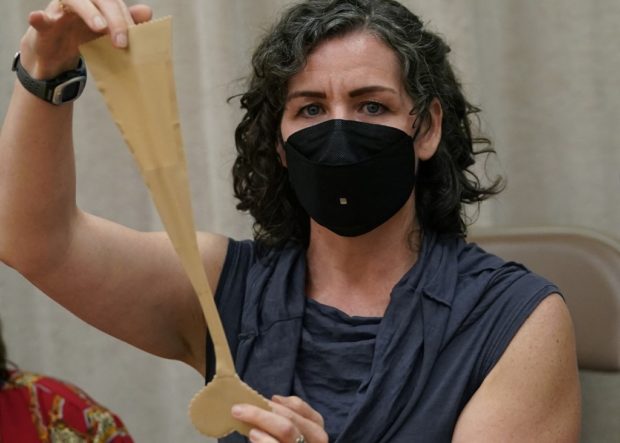Sex-scene experts help reshape Hollywood power dynamics in #MeToo era

People attend an intimacy workshop run by Intimacy Directors and Coordinators (IDC), to educate people in the entertainment industry, including directors, actors, and producers, on how to safely and effectively tell the story of intimacy in performance, in New York City on October 7, 2022. (Photo by TIMOTHY A. CLARY / AFP)
LOS ANGELES, United States — Since Hollywood sex abuse revelations ignited the #MeToo movement five years ago, demand for on-set “intimacy coordinators” has soared — but resistance, power imbalances and a fear of saying “no” to sex scenes are deeply rooted in show business, experts say.
A fledgling industry of professionals who choreograph intimate scenes, provide equipment to safeguard actors’ privates and discuss consent with filmmakers has grown rapidly since a 2017 investigation into Harvey Weinstein forced a wider reckoning.
“It has been an amazing difference, in that when it was first introduced, there was a lot of resistance from the industry — from directors, some actors, producers,” said Claire Warden, a New York-based intimacy coordinator.
Warden estimates around 60-80 experts are now working on sets, and she is working with Intimacy Directors and Coordinators (IDC) to quickly train more.
“After years of yelling into the void and pushing as hard as we could in the industry to educate,” the industry has started listening, she said.
Article continues after this advertisementBefore 2017, intimacy directors existed primarily in theater, and were conspicuously absent in film and television, where actors were often isolated and reliant on wardrobe departments to improvise basic “modesty garments” to cover their genitalia in nude scenes.
Article continues after this advertisementOne of the first major shifts came from HBO, which in the aftermath of the Weinstein allegations brought an intimacy expert onto the set of “The Deuce” — an explicit show about the porn industry in 1970s New York.
Since then, the network has expanded its policy to require intimacy coordinators on all its shows.
And at specialized equipment companies, strapless thongs, padded pouches and silicone “barriers,” as well as body tapes in various skin tones are all on offer.
In a recent Variety interview, 25-year-old “Euphoria” star Sydney Sweeney said she has “never felt uncomfortable” thanks to the constant presence of intimacy coordinators.
“It’s a very safe environment. I’m very fortunate that I am coming up during a time where there is so much thought in this process,” she said.
“Even if you have agreed to something, they ask you on the spot on the day, ‘Did you change your mind? Because you can.’ It’s really nice.”
‘Predators’
Like Warden, others in the industry argue the progress around consent is long-overdue, while recent events have shown that not all welcome the new roles.
In the same Variety interview, “Yellowjackets” actor Christina Ricci, 42, revealed that she once informed a movie set she was uncomfortable with an intimate scene, and “they threatened to sue me if I didn’t do it.”
“It’s not that actors suddenly started speaking up in 2017… We’ve been speaking for ages, just no one was listening,” said Warden.
“The industry was actively trying to silence those voices.”
Actors are often taught to ignore or forgo their right to consent, and that “no” is a “dangerous” word, she said.
“We are conditioned… that you will be called a diva. That you won’t get jobs, that no-one will work with you.”
Intimacy coordinators also told AFP they are still overcoming fears that their presence could stifle creativity, or expose cast and crew to the perils of “cancel culture.”

Claire Warden, of Intimacy Directors and Coordinators (IDC), shows off intimacy garments during an intimacy workshop run by IDC to educate people in the entertainment industry, including directors, actors, and producers, on how to safely and effectively tell the story of intimacy in performance, in New York City on October 7, 2022. (Photo by TIMOTHY A. CLARY / AFP)
“Because of the historical backdrop of Harvey Weinstein, a lot of people were afraid that they were being perceived as predators,” said Jessica Steinrock, who has amassed half-a-million followers discussing intimacy coordinator work on TikTok.
Rather than acting as an arm of human resources, intimacy coordinators exist to reduce risk and improve performances in the same way a stunt coordinator does, she said.
“I think the exponential growth in the last few years has been painful for many but really rewarding overall,” Steinrock said.
‘Toxic’
Still, there are high-profile hold-outs.
Earlier this year, actor Frank Langella was fired from Netflix’s “The Fall of the House of Usher” for alleged unacceptable conduct on set including sexual harassment of an actress.
In a column for Deadline, he blasted an intimacy coordinator’s instructions about where he could touch the actress on her leg during an intimate scene as “absurd” and “ludicrous.”
“It undermines instinct and spontaneity,” he wrote.
But for Warden, reading that op-ed, “it is clear that his resistance does not come from lack of understanding.”
“That comes from a lack of willingness to consider other people’s consent. That comes from a toxic sense of entitlement.”
And, Steinrock said, intimacy coordinators alone cannot solve the type of harassment illustrated by Weinstein, whose abuses did not generally occur on film sets.
“The way we treat scenes of intimacy is going to have ripple effects in every other way, about how we talk consensually, how we prepare for things, how actors see their own bodily autonomy,” she said.
“But I think it’s important that we don’t treat intimacy coordinators as a panacea for all of the power and harassment and abuse of power that’s happened in the entertainment industry over the last century.”